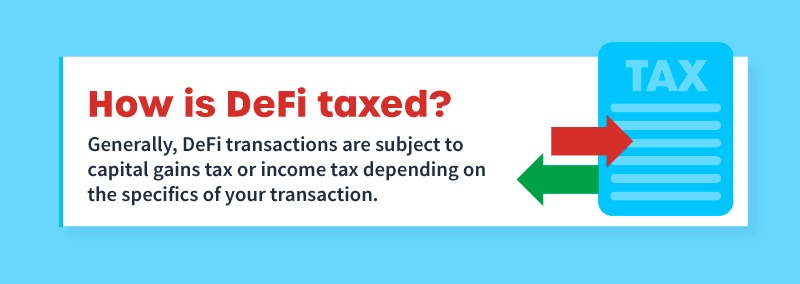What does the future hold for crypto taxation, particularly when it comes to Decentralized Finance (DeFi) earnings? Understanding the evolving landscape of crypto taxation has become essential as the popularity of digital assets continues to rise. With an increasing number of individuals and businesses participating in DeFi, it is crucial to comprehend how to accurately report these earnings for tax purposes.
Understanding Crypto Taxation
Crypto taxation refers to the rules and regulations governing the taxation of cryptocurrency transactions. Various jurisdictions have different approaches, but the overarching principle is that cryptocurrencies are treated as property rather than currency. This classification has significant implications when it comes to how gains and losses are reported on tax returns.
Differentiating Between Capital Gains and Income
In the context of crypto taxation, it is vital to distinguish between capital gains and income. Capital gains occur when you sell a digital asset for more than you paid for it. Conversely, income is generated from activities such as staking, lending, or earning yield in a DeFi platform. Understanding these two categories will help inform how you report your earnings.
Tax Implications of Different Crypto Transactions
Every transaction involving cryptocurrency can have tax implications. Selling, trading, lending, or earning interest can all trigger taxable events. You must familiarize yourself with the specifics of your jurisdiction to ensure compliance.
| Type of Transaction | Tax Implication |
|---|---|
| Buying Crypto | No tax implication |
| Selling Crypto | Capital gains tax |
| Trading Crypto | Capital gains tax |
| Earning Interest | Ordinary income tax |
| Yield Farming | Ordinary income tax |
The Challenge of Reporting DeFi Earnings
As DeFi platforms continue to grow in complexity, reporting earnings from these sources has become increasingly challenging. The decentralized nature of these platforms often means that there is little to no centralized authority to provide you with tax documents, making it your responsibility to track and report your earnings accurately.
Tracking Your Transactions
In order to report your DeFi earnings correctly, meticulous tracking of all transactions is essential. Many DeFi platforms do not provide users with tax documents, so it becomes your responsibility to maintain thorough records of your transactions throughout the year. This includes:
- Dates of transactions
- Amounts transacted
- Values at the time of each transaction
- Purpose of the transaction (e.g., lending, staking)
Using blockchain explorers and portfolio tracking applications can assist in maintaining accurate records.
The Importance of Documentation
Having solid documentation is vital for supporting your tax filings. This documentation should include transaction histories, wallet addresses, and any relevant contracts associated with your DeFi activity. Proper documentation can help provide clarity should your tax filings come into question.

Tax Reporting for DeFi Earnings: A Step-by-Step Guide
Transitioning from general information to practical application is essential. Below is a step-by-step guide to help you navigate tax reporting for your DeFi earnings.
Step 1: Gather Your Data
The first step involves collecting all relevant transaction data from your various wallets and DeFi protocols. This information is crucial for accurate reporting.
Step 2: Determine Your Earnings
After compiling your transaction data, categorize your earnings into capital gains and ordinary income. Capital gains arise from the sale of assets, while ordinary income can come from staking or yield farming.
Step 3: Calculate Your Gains and Losses
Once you’ve categorized your earnings, calculate your total gains and losses.
-
Capital Gains Calculation: [ \text = \text – \text ]
-
Ordinary Income Calculation: The income earned from DeFi activities generally reflects the fair market value of the tokens at the time you receive them.
Step 4: Report Earnings on Your Tax Return
Finally, report your findings on your tax return.
-
For Capital Gains: Capital gains are typically reported on Schedule D and Form 8949 in the United States.
-
For Ordinary Income: Report ordinary income on the standard income tax section of your tax return.
Step 5: Keep Records for Future Reference
Once you’ve submitted your return, retain all documentation for at least three years, as this is generally the period during which the IRS can audit your tax filings.
The Impact of Regulations on DeFi Taxation
As the crypto landscape evolves, so too does the regulatory environment surrounding it. Numerous countries are beginning to form regulations tailored specifically for cryptocurrencies and DeFi platforms. Understanding the potential implications of these regulations is crucial for future compliance.
Analyzing Current Trends in Regulation
Recent developments in crypto taxation have centered around the increasing need for clarity and compliance. Governments are beginning to see the importance of regulating crypto to prevent tax evasion and ensure that transactions are reported properly.
Upcoming Regulatory Changes
With new frameworks being proposed, it is important to stay informed about potential legislative changes. This vigilance can help you anticipate changes that may affect how you report your DeFi earnings.

The Role of Tax Software in DeFi Reporting
As you navigate the complexities of reporting DeFi earnings, utilizing tax software designed specifically for cryptocurrency can simplify the process significantly. These tools can automatically aggregate your transaction data and calculate your gains and losses.
Key Features to Look For in Tax Software
When selecting tax software for DeFi reporting, consider looking for features such as:
- Integration with multiple wallets and exchanges
- Automatic price tracking for crypto transactions
- Support for various types of transactions (e.g., lending, staking)
- Comprehensive reporting capabilities
Popular Tax Software Options
There are several reputable tax software options specifically designed for cryptocurrency taxation. Here’s a brief overview of a few you might find helpful:
| Tax Software | Key Features |
|---|---|
| CoinTracking | Portfolio tracking, capital gains reports |
| CryptoTrader.Tax | User-friendly interface, direct integration with exchanges |
| Koinly | Automated tax reporting, supports multiple countries |
| TaxBit | Comprehensive reporting, IRS-approved forms |
Future Trends in Crypto Taxation
As the cryptocurrency industry continues to grow, the taxation landscape is also expected to evolve. Consider the following trends that could shape the future of how you report DeFi earnings.
Increased Transparency and Reporting Requirements
As governments focus on increasing tax compliance, there may be a shift toward more stringent reporting requirements for both individuals and businesses involved in cryptocurrencies. This could involve mandatory disclosures for larger transactions, akin to those required for traditional financial securities.
The Rise of Central Bank Digital Currencies (CBDCs)
With many countries exploring the introduction of CBDCs, the nature of cryptocurrency transactions may change. CBDCs could lead to a new framework for taxation that is more clearly defined than existing regulations surrounding decentralized assets.
Expanded Use of Blockchain Technology for Tax Reporting
Emerging technologies, including blockchain itself, have the potential to streamline the tax reporting process by providing more accessible means of tracking transactions. Future systems may leverage smart contracts to automate aspects of tax compliance.

Navigating Cross-Border Tax Implications
If you engage with DeFi platforms from different countries, cross-border tax implications may arise. Understanding how different jurisdictions treat crypto transactions is vital in ensuring compliance and avoiding double taxation.
The Importance of Double Taxation Agreements (DTAs)
Many countries have entered into DTAs to prevent double taxation on income earned in another country. Familiarizing yourself with the implications of these agreements can help you navigate your obligations more easily.
Tax Residency Considerations
Your tax residency also plays a significant role in how DeFi earnings are taxed. Tax residency typically depends on where you live and your citizenship status, and it is essential to know the rules governing your jurisdiction.
Conclusion
Navigating the world of crypto taxation, especially regarding your DeFi earnings, is no small feat. With the landscape continuing to evolve, staying informed and organized is key to ensuring compliance. Properly tracking your transactions, understanding the implications of different types of earnings, and leveraging technology can make the daunting task of tax reporting more manageable. As you look to the future, consider developing robust record-keeping habits and remaining vigilant about regulatory changes to maintain compliance in this rapidly changing field.



 Bitcoin
Bitcoin  Ethereum
Ethereum  XRP
XRP  Tether
Tether  USDC
USDC  Lido Staked Ether
Lido Staked Ether